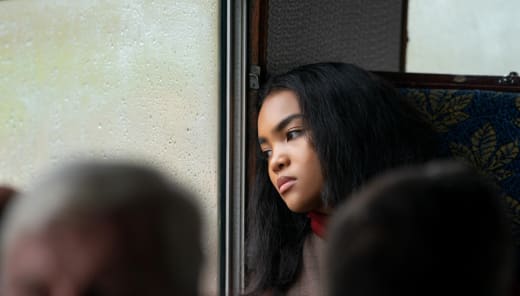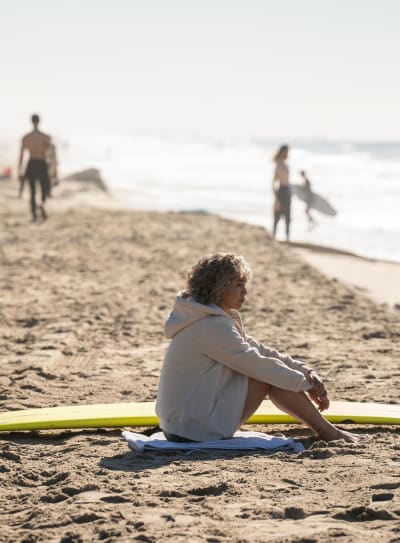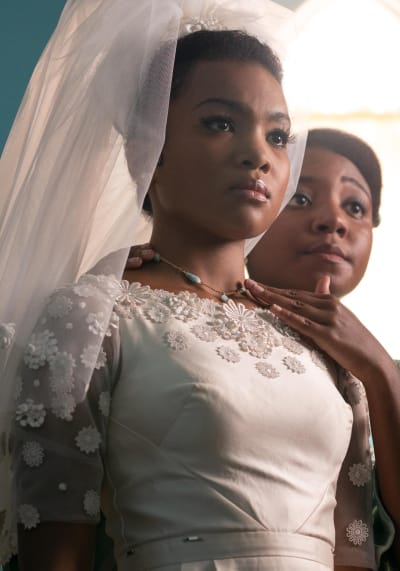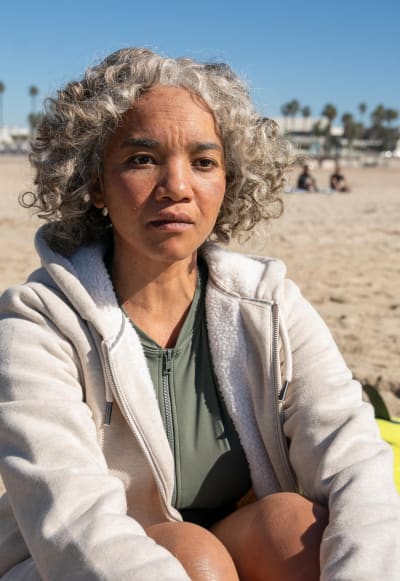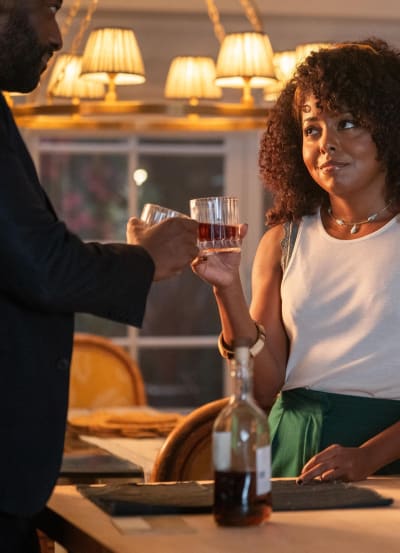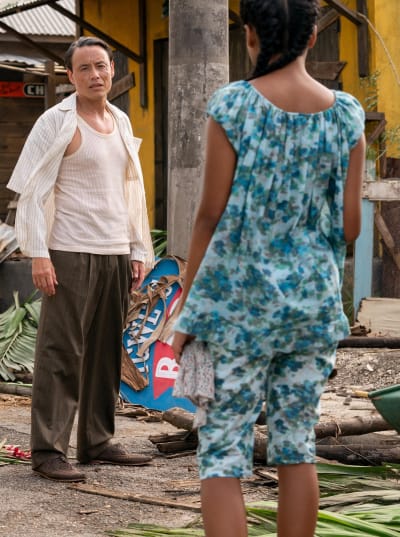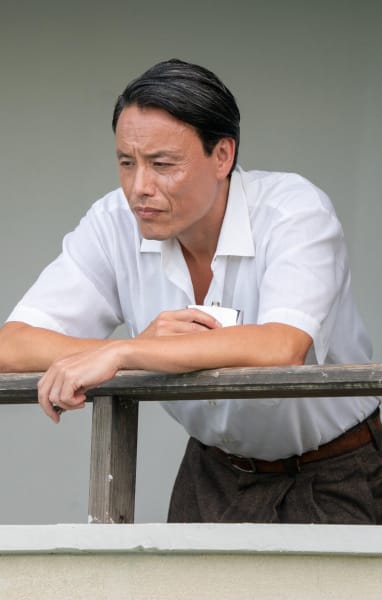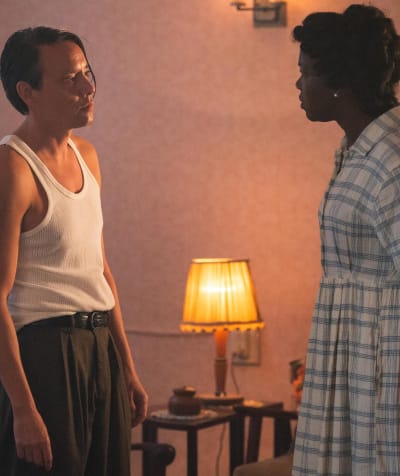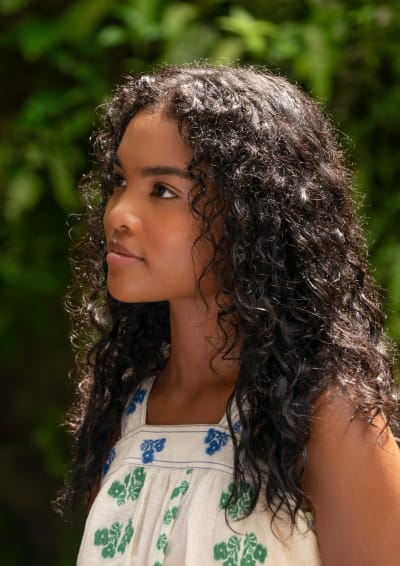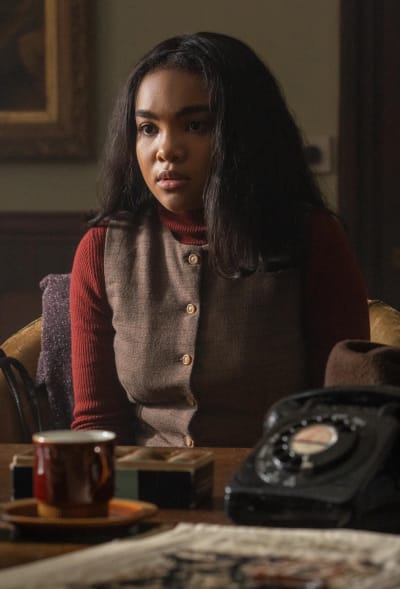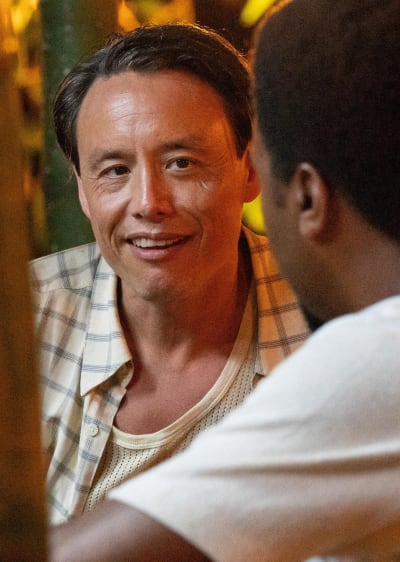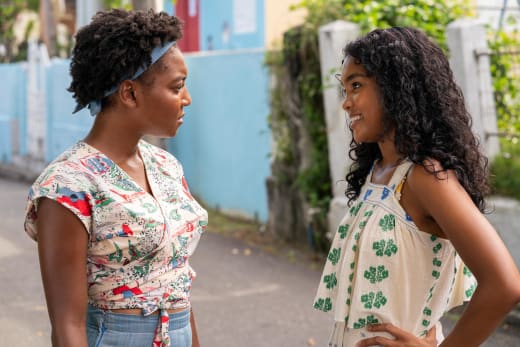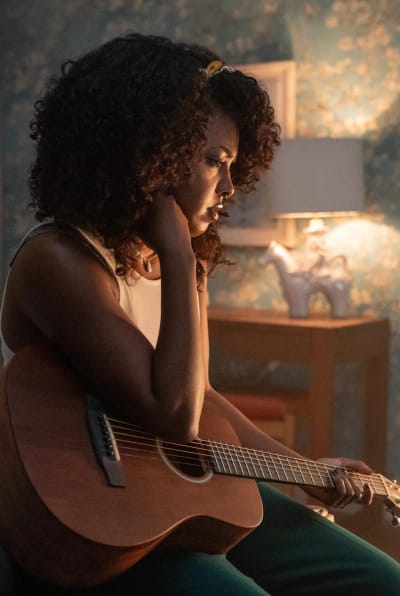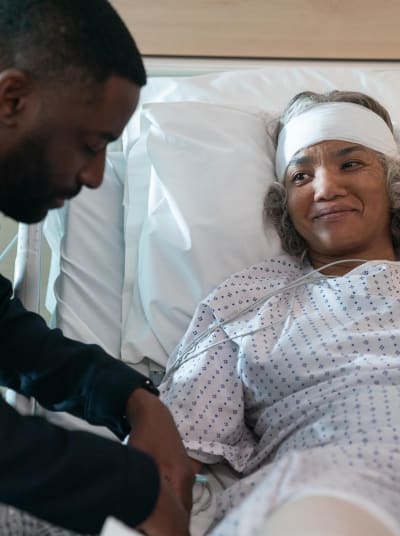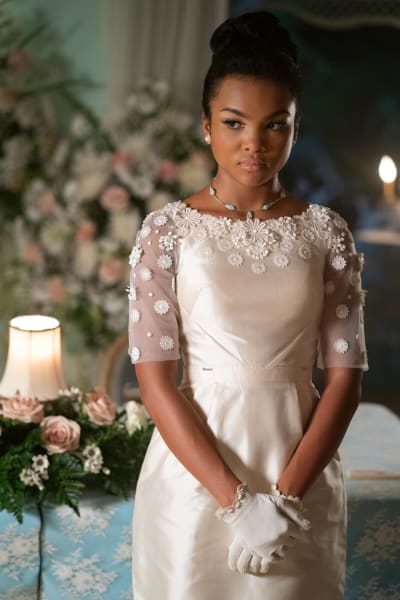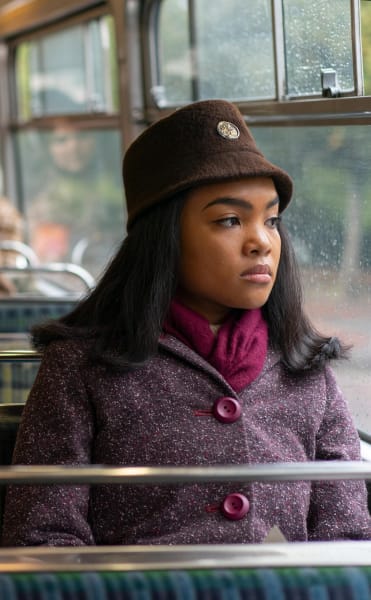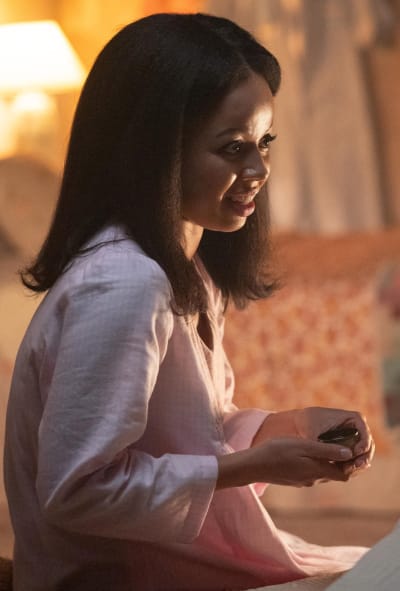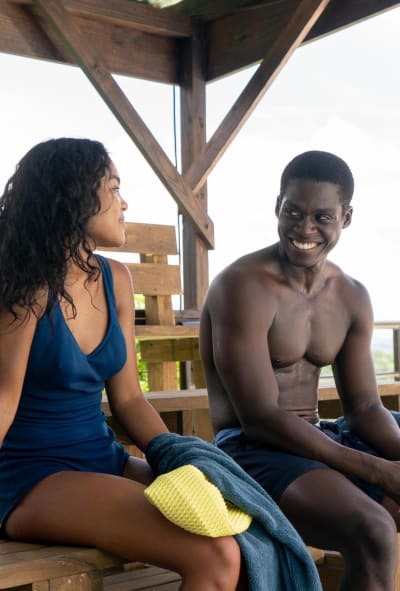Families are complicated, and everyone has a story.
It’s one of many summations one concludes upon tuning into the first three installments of Black Cake.
The series is adapted from the New York Times Bestselling novel by author Charmaine Wilkerson, with an impressive cast led by the incredible Mia Isaac.
Black Cake is an ambitious and tall order, as most book-to-series adaptations tend to be, and whether or not it lives up to the refinement and greatness of the novel is left up to those who are most familiar with the book.
In that sense, Black Cake is a series that feels tailor-made specifically for those familiar with the source material, and if you fall outside the scope of that, there’s a solid chance that you’ll have some struggles following along with the series.
This globe-trotting, timeline-hopping, perspective-shifting family drama is undoubtedly unique.
It also taps into and makes a full-hearted attempt at filling some of the voids left behind by esteemed family dramas such as This Is Us or Queen Sugar.
In fact, with Oprah Winfrey’s executive producing the piece, it has notes of Queen Sugar, from some of the stylistic choices in the storytelling to the incredible and thoughtful cinematography.
These are the things you easily get lost in during the first three installments.
Please be warned there will be spoilers ahead for all three episodes moving forward.
Despite the quick jumping about throughout Black Season 1 Episode 1 as we’re introduced to Eleanor in the present and her children and Covey in the past, Black Cake still is the very definition of a slow burn.
Eleanor is not my real name, B and B. There are people who have spent their entire lives wondering what happened to the girl I used to be. And when this is over, after you have heard the truth in full, I want you to find those people and tell them.
Eleanor
The contradictory nature of this can be jarring at times.
We barely spend time with Eleanor, this beautiful older woman by the sea who is so tuned into the water that she becomes one with it, nearly to her detriment in what appears to be an attempt at disappearing permanently into the ocean.
Then we’re transported to the hospital with Eleanor, her sharing moments with her son Byron and listening without much of a reaction to the doctor telling her that she has a brain tumor.
And before we can even process that, with little indication outside of the dialogue, it’s a year later.
Eleanor’s adult children, Byron and Benny, are in an office waiting to hear the reading of her will, which kickstarts this whole deep dive into the complex life and misadventures of an Island girl and how she became their mother.
Covey was dead, or so I thought. It didn’t take me long to learn that you can’t run from the truth. You can’t run from who you really are. Eventually, the truth will surface, and when it does, you must reckon with it.
Eleanor
There is no space or time for these developments to breathe as the series is eager to dive right into the story of young Covey and the many lives she led on her path toward becoming Eleanor Bennett.
You cannot fault the series for wanting to dive right into Covey’s story.
It’s quickly evident, even with the limited time spent with Benny and Byron in the present during these first three installments, that their scenes aren’t as compelling as anything Mia Isaac brings to the table playing such a rich and complex character like Covey.
But the organic flow from present to past is lacking and unnerving at times, especially as the season progresses and takes detours, giving us flashbacks within flashbacks like some flashback inception and varying perspectives.
Black Cake Season 1 Episode 1 drops us into Covey’s life as a teen girl in Jamaica who aspires to be a swimmer, has a best friend, Bunny, and a boy she genuinely loves in Gibbs.
Before any of that settles in, we’re whisked into the complications that arise when her father, Lin, and his compulsive gambling and drinking lead to Covey paying for his sins with a forced marriage that makes you cringe.
Lin and Covey have a complicated relationship. Still, it’s one which the series barely seems to scratch the surface of, as it often resorts to spoonfeeding us things through dialogue that may very well go over your head at times rather than showing us.
We learn over time that Lin’s penchant for gambling and putting his family at risk must’ve driven his wife and Covey’s mother away, and for reasons unknown, she didn’t consider taking her daughter with her when she bailed.
Instead, she left Covey there to deal with a father whose warped way of providing for his family put them in more danger and her mother’s best friend serving as a housekeeper, trying to add some levity to the household.
I want you to know that when this is over, when I am another man’s property, you’re dead to me.
Covey [to Lin]
Lin often waffles between coming across as a sincere father who genuinely loves his daughter and a terrible piece of crap of a person.
Simon Wan does a fantastic job of bringing some real depth and dimension to this character.
By Black Cake Season 1 Episode 2, when we strangely and rather abruptly deviate into his perspective of things from his experiences as a child, his love at first sight moment with Matilda, and the events leading up to the wedding and Little Man’s murder, he’s a far more riveting character than expected.
Only then do we get a better sense of the contradictory nature of his wanting to protect and provide for his family while also being the thing that implodes it.
But I wanted to see Lin and Covey playing off one another a bit more to have a full understanding of that dynamic.
By Black Cake Season 1 Episode 3, Covey is damn near about to drown herself in the Scottish sea.
She’s longing for her father, and while Lin manages just to pull off being a compelling character on his own, there’s not enough detail about their relationship that helps one connect to the father/daughter dynamic on its own.
Lin is a complicated man, one who drunkenly calls his ex-wife a slur, makes his daughter feel inadequate, and sells her off to the local crime boss who terrorizes everyone.
But he’s also the man who almost lost it when he thought Covey drowned at sea and nearly killed himself when he got word that she died overseas as it hit him that he lost everything he loved by his own doing.
There was so much to mine with Lin and Covey’s relationship and many things to explore, even the unique experiences they had on the island.
With Lin’s decades-long battle of being a child of the diaspora, growing up in a place that treated him like an unwarranted foreigner facing discrimination as a Chinese immigrant versus Covey Lyncook‘s own experiences as a biracial woman in the ’60s lacking some form of connection.
They barely scratch the surface of topics like this for either character, hardly at all with Lin.
I started working here for Mathilda. I stayed for Covey, so she would have someone other than you to look over her. But no, she’s dead and if you hadn’t pissed away your money, your business, and your dignity, she’d still be here, Mathilda would still be here. So as much as I pity you, Lin, I no longer feel obligated to work for you. I have to live my own life. I suggest you do the same now that you for some reason have a second chance.
Pearl
And with Covey, by whisking her away to predominantly white spaces in the 60s and 70s, she essentially has to trade in her more specific and unique experience as a biracial woman for the more commonplace, run-of-the-mill racism and xenophobia as a Black immigrant in England and Scotland.
The thematic nature of the series that one decision can spiderweb in its effects, changing the course of your life and others around you is solid, and it makes for some compelling storytelling.
If Lin hadn’t sold his daughter, Little Man would not have gotten killed. Covey wouldn’t have needed to flee her homeland in fear that she’d be held accountable for his death.
She wouldn’t have had to leave the man she loved or hide away and lose herself in London. She certainly wouldn’t have had to befriend and subsequently lose the darling Elly or become her, and maybe she’d have been spared horrific traumas such as her sexual assault.
Gibbs saw me for who I really was and who I wanted to be. If I had known I would spend the rest of my life hiding the girl he loved, I would’ve stayed on that farm with him forever.
Eleanor
But these choices extend to those around her as well.
Lin Lyncook, without his daughter, seemed lost, and he fell even deeper into the same vices that got him in trouble in the first place, making him a sad, lonely, bitter man.
And we’ve yet to unravel how everything affected Gibbs fully. He was London-bound to become a lawyer. But there’s more to the wedding night we’ve yet to understand, as he was skulking around when Little Man got poisoned and may be behind it.
Losing Covey may have changed the trajectory of his life as well. We’re certainly left hanging in that regard after Black Cake Season 1 Episode 3, with he and Covey locking eyes across the street amid a protest against discrimination in London.
Bunny: He’s not my type either.
Covey: Then who is?
Bunny: I don’t know.
Covey: Yes, you do. Tell me. Tell me.
Bunny: You. Okay? I like you.
Covey: Yeah, well, I know that.
Bunny: Do you?
Covey: You can’t say that. Bunny, you know rumors can get people killed. It’s dangerous.
Bunny: It doesn’t change; that is who I am.
Covey: I’m not asking you to change.
Bunny: No, you’re asking me to hide.
Covey: For your own safety.
Bunny is another character whose life was severely altered because of so many decisions made outside her own.
One of the most surprising developments with Bunny was learning that she was in love with Covey. Based on the constant timeline jumping and potential perspective shifting, we’ll likely dig deeper into that.
And there’s certainly something worthwhile in exploring what it was like for a Black queer girl in Jamaica during the 60s and 70s, but there’s already a fear that the deviation will detract from the rest of the story no matter how worthwhile a plot that is on its own.
Black Cake is at its best when it focuses exclusively on Covey and her journey, particularly after she fled Jamaica. It’s a particular part of the timeline that thrives when it’s linear.
Eleanor: Pa’s lucky streak may have ended, not mine. I had been given a second chance and a new story to tell. B and B this is how I really became your ma, the woman you know as…
Covey: Eleanor.
Even the moments of jumping back in time, flashing back within a flashback, can be confusing or drag.
Understandably, the series intends to cover the interconnectedness of everyone, linking Covey and her journey to her past, including via her father and his experiences, and her future with her children and what transpires with them.
It’s certainly a tale emphasizing generational trauma and impact, something we see to some degree with Lin and Covey and will likely learn more about with Eleanor and B and B.
We have an inkling of things going awry as we’ve learned that Benny Bennett has been estranged from her brother and mother for eight years.
When you hear it off the bat, it’s difficult to feel any empathy for Benny when she never checked in when she heard Eleanor was in the hospital and didn’t return home until after Eleanor died.
While you can comprehend why she would be so excited about finally knowing her mother’s story, it contrasts with Byron, who carries the weight of being the child who was still and always there.
Byron Bennett, presently, is more sympathetic in that regard, for as little as the current timeline is of any interest.
They also sprinkled in some workplace drama with Byron, with him getting screwed out of a promotion that he had been working toward for the better part of a decade.
Here’s to the past. May it not blow up our present.
Byron
We’re easily led to believe that the unimaginable slight is due to some “Good Ole Boys” bullcrap, which is frustrating, and they’ll likely elaborate on that and more of Byron’s life later in the series.
But there’s a disconnect with Byron and Benny in the present when Covey’s story is far more gripping in the past.
Mia Issac is a tour de force, and in a series that feels disjointed, she’s certainly holding things together with her strong performance.
Musings:
- The cinematography is absolutely stunning and is very much a strong vehicle for storytelling; the warmth of Jamaica contrasts so much with the dreariness of London and Edinburgh. Sprawling shots with settings serving as their own characters suck you right into the story.
- We barely had much of Chipo Chung as Eleanor, but her narration is divine. Her voice is so soothing and melodic and vital to telling this story.
- My heart broke the second Covey’s boss was nice to her because it was evident where that plot was leading, right down to Beatrice being a victim, too.
- Baby, Byron finding out that he got screwed out of a job could’ve been a damn email!
Benny: You are a great listener.
Charles: I’m a lawyer. It’s my job.
Benny: Is that all this is to you? A job?
- Were Eleanor and Charles carrying on a little something? He seems as though he was in love with her by the end.
- Elly was such a beautiful spirit, and it was heartbreaking when she died. Not since Bunny did Covey have a person so near and dear to her.
- Is it safe to say that Pearl and Gibbs had something to do with killing Little Man? The whole thing with the lilac and cake was telling, and Pearl may have heeded Covey’s plea for help.
- Also, should we be worried about Little Man’s men following her?
- Eleanor surrendering herself to the sea like Lin did decades before was so provocative. I definitely crave so much more regarding the father/daughter.
- Black Cake‘s more subtle racial components feel more meaningful and impactful than the overt ones —
- Covey’s hair, for example — how she went from naturally curly and wavy to straightened in the UK, the reaction to her food by the children — all these little things about the cost of assimilation and losing one’s identity for the status quo were most powerful and relatable.
Over to you, Black Cake Fanatics.
What are your thoughts on this series? Do you feel it lives up to the hype or the books? How do you feel about Covey’s journey thus far? Will you be tuning in? Please sound off below.
Black Cake drops new episodes on Wednesdays on Hulu.
Jasmine Blu is a senior staff writer for TV Fanatic. She is an insomniac who spends late nights and early mornings binge-watching way too many shows and binge-drinking way too much tea. Her eclectic taste makes her an unpredictable viewer with an appreciation for complex characters, diverse representation, dynamic duos, compelling stories, and guilty pleasures. You’ll definitely find her obsessively live-tweeting, waxing poetic, and chatting up fellow Fanatics and readers. Follow her on X.

